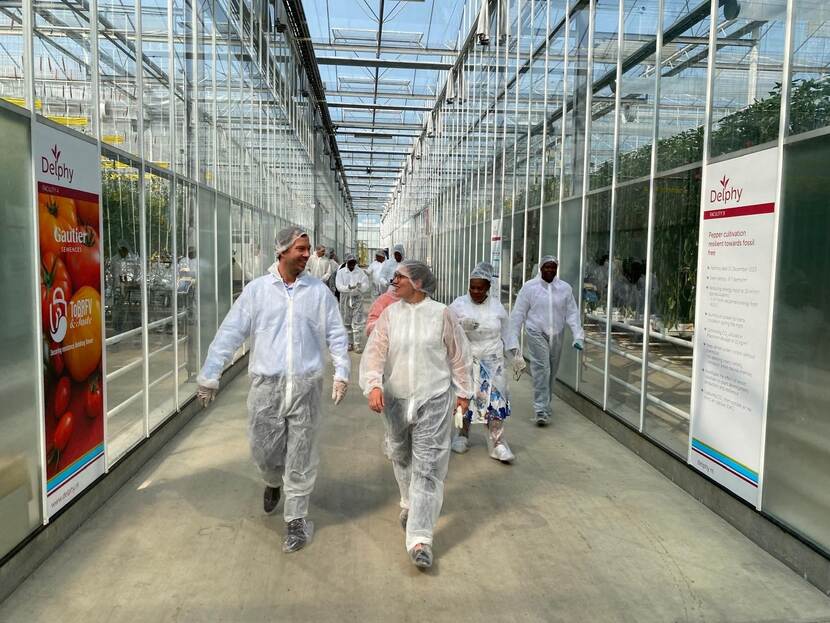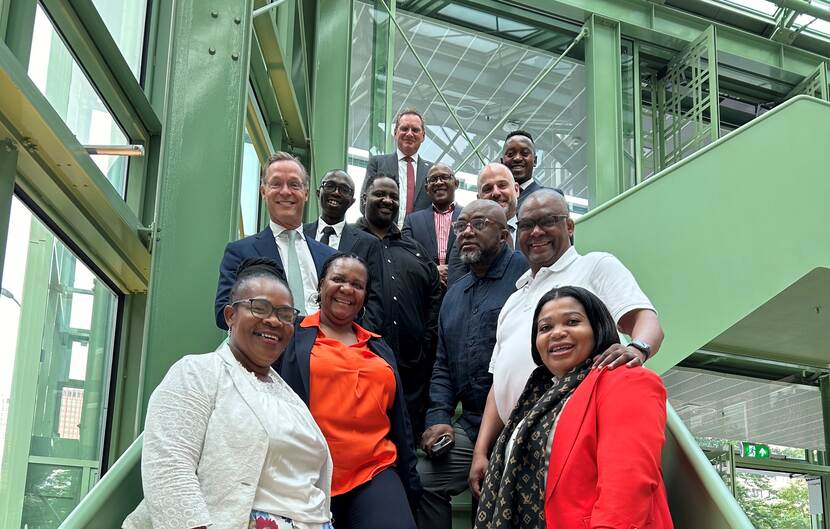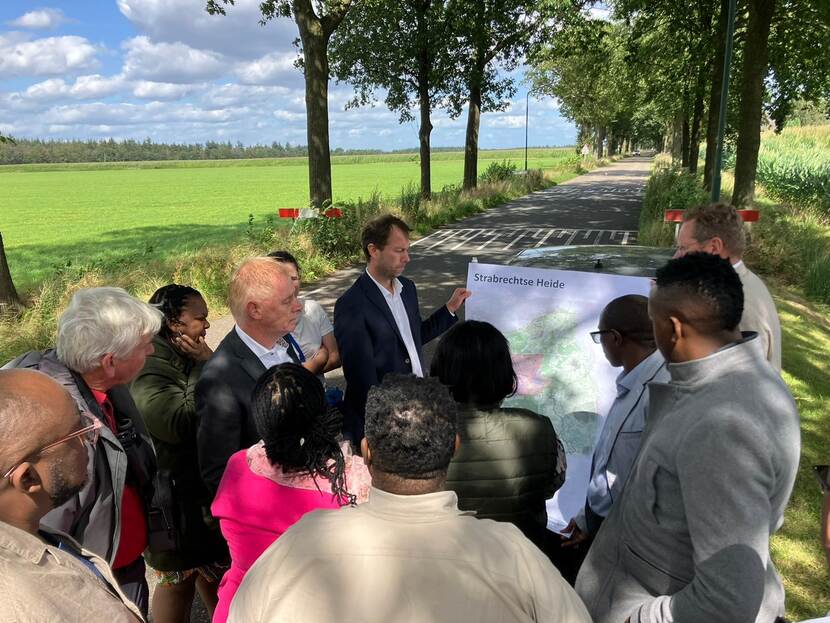South Africa's stakeholder engagement for a just energy transition
As a Just Energy Transition Partner (JETP), the Netherlands supports South Africa’s ambitions to transition to a low-carbon economy, while creating sustainable livelihoods through climate-smart agriculture. This involves working with Eskom, provincial policymakers, local communities, and businesses. To strengthen our collaboration we invited key stakeholders from Mpumalanga province to the Netherlands to share our experiences on transitions, climate-smart agriculture and integrated development. In this way, South African stakeholders can identify how best we can work together. Over the course of last week these stakeholders met with policymakers, agro-business and key people involved in transitions in the Netherlands, in an intense programme organised by RVO.

Grootvlei JET project
The Netherlands is a member of the JETP together with France, Germany, the US, UK, Denmark, and the EU. This partnership aims to support South Africa’s decarbonisation efforts through an initial US$8.5 billion (€7.6 billion*) in financing efforts, with a focus on creating alternative livelihoods to ensure no one is left behind.
Being a global leader in agriculture and integrated development planning, the Netherlands recognised a gap to support this initiative by creating opportunities in the field of climate-smart and future-proof agriculture. These innovations can be deployed to ensure that people affected by the transition have alternative career opportunities.
Together we have been working with the national electricity company, Eskom, and identified Grootvlei Power Station as a suitable location to develop an agro-hub. Grootvlei is strategically located near the major N3 highway between Johannesburg and Durban, and roughly an hour away from Johannesburg, the country’s economic hub. This year, the first phase of the project will come to fruition when a half-hectare demonstration greenhouse is opened. This will serve as a training hub and commercial greenhouse, that will be scaled up to 10 hectare open-field and 10 hectare greenhouse farming as part of the next phase, later becoming a fully-fledged agrohub.
Throughout this process, we have supported community engagement initiatives that have allowed Eskom to align their vision with the community’s and address concerns. As part of our ongoing support, last year we hosted a visit to the Netherlands with our Grootvlei partners, including Eskom, who saw immense value in this visit for the Grootvlei project, in terms of inspiration and seeing the value of the Netherlands as a strategic partner. This lead to a second visit this year to inspire more partners.
A jam-packed programme
This visit took place last week and aimed to showcase Dutch agri-tech innovations and integrated approaches with water as a guiding principle. This was also an opportunity to reflect on different economic transitions in the Netherlands, from Limburg to Groningen, and the multi-faceted nature of these transitions.
Beginning on Monday, we commenced our visit at the Ministry of Agriculture, Fisheries, Food Security & Nature (LVVN) and the Ministry of Climate and Green Growth where we discussed Dutch international agriculture policy, as well as Dutch climate policy so that South African partners can better understand the way we work. Our South African delegation were welcomed by HRH Jaime de Bourbon de Parme, Netherlands Climate Envoy, who took great interest in the Grootvlei project.
This was followed by an introductory meeting in the afternoon at World Horti Centre, with the potential Dutch Impact Cluster companies, who intend to be involved in the first phase, half-hectare greenhouse at Grootvlei. This allowed Dutch and South African stakeholders to introduce each other and to align understandings of the project. Invest International, who was also present and interested in Grootvlei, used this opportunity to get a better understanding of the technicalities of this project.

Throughout the programme, there were several visits related to economic transitions, starting in Heerlen with Limburg’s black-to-green transition. JET involves South Africa moving away from a coal-based economy, and thus Limburg allows us to share relevant challenges and best practices with South African partners, in order to avoid repeating similar mistakes. In Limburg, communities felt excluded in the transition process, with long-lasting economic impacts for those communities. This is a valuable lesson we can share with our South African partners. Similarly, the development Flevoland affected fishing communities, which our partners learned about during a visit to the Zuiderzee Museum. Despite being a very different type of transition, this also provides useful lessons to ensure no communities are left behind going forward. Lastly, hydrogen expert, Patrick Cnubben, discussed the Gas-to-Green Hydrogen transition taking place in Groningen with the South African partners. This was a collaborative exchange, that not only allowed us to share our experiences of an ongoing transition, but to also learn from the experiences of South Africa’s current transition.
Additionally, during the programme, we were able to showcase the types of Dutch innovations that could be valuable to the development of the Grootlvei agrobub. With the support of organisations such as Delphy and AgrowSer, we could introduce our visitors to the latest innovations, the benefits of climate-smart technology, and farming with minimal inputs. These visits helped stakeholders to better understand what Dutch agri-tech has to offer in Grootvlei, but to also inspire these key stakeholders about the long-term opportunities for climate-smart agriculture in Grootvlei.
Learning about these climate-smart practices goes hand-in-hand with learning about the ecological component of transitions. At National Park Biesbosch and Strabrechtse Heide, our visitors discussed the importance of preserving nature and also the economic value in local ecology. Working in an integrated way where agriculture is in balance with nature, and communities are part of the decision making process are key for the success of any project.

An inspiring visit: the next steps
From this visit, we hope to have inspired these stakeholders and strengthened our SA-NL partnership. This visit gave policymakers an opportunity to better understand how Dutch and South African policies align, and bring them closer to the project, as well as provide the enabling support needed to make this partnership a success. Part of this means discussing a roadmap for the way forward and how each stakeholder will take responsibility going forward, feeling confident in their role of making Grootvlei JET agrohub a success. It is a privilege to have hosted these key players in our home and to exchange knowledge and experiences.
The Grootvlei project is now pushing full-steam ahead. With the construction of the first-phase, half-hectare greenhouse imminent and more stakeholders in the region seeing the potential of the project, it is an exciting time to be a JETP partner and to support South Africa’s decarbonisation efforts in a way that leaves no one behind.
For more information please contact LAN Pretoria: pre-lnv@minbuza.nl